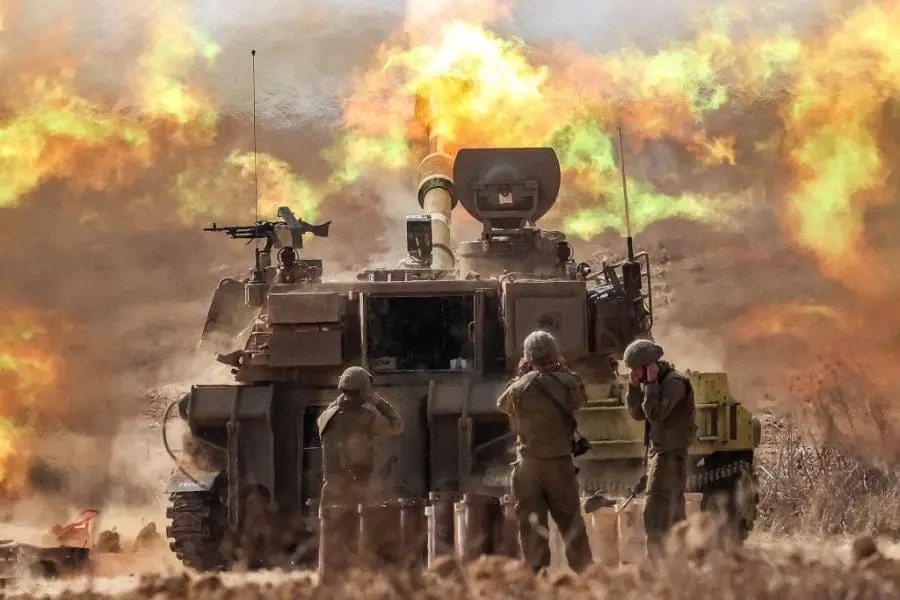Politics
Israel’s War on Gaza: Impact and Regional Response
 courtesy of jacobin.com
courtesy of jacobin.com
The Gulf's Influence on Gaza
As the Gulf countries seek to expand their reach through free-trade agreements and diplomatic normalization, Gaza finds itself affected by these transformations. Gulf money plays a dominant role in shaping the region's political and economic landscape, imposing its own vision and limiting freedoms. However, there are distinctions between Saudi Arabia, the UAE, and Qatar, with Saudi Arabia having its own internal dynamics and forces.
Saudi Arabia and the UAE's Position on the War
The UAE has taken significant steps towards normalization with Israel, while Saudi Arabia's position remains unclear. Saudi Arabia, as the largest Gulf country, has maneuverability and may try to mediate between the parties to benefit from all outcomes. However, it is uncertain whether Saudi Arabia would rush to normalize relations with Israel when it can offer a higher price to the Palestinians. Both countries' positions are crucial in shaping the conflict.
Egypt's Relationship with Gaza
Egypt recognizes the independence of the Palestinian national decision-making process and wants to preserve Gaza as a place under the administration of the Palestinians. Egypt does not want to control Gaza due to the challenges it would pose to its own political equation. Egypt has learned from its past experiences and understands the consequences of managing a territory with armed forces. The Egyptian state, including the army and intelligence services, thinks similarly and has been consistent in its approach since 1967.
Calculations of Other Regional Powers
With the exception of the UAE, Saudi Arabia, and Israel, most regional powers are facing crises socially, politically, and economically. The idea of war becomes plausible for these parties as a way to escape their crises and gain advantages. Iran, for example, may see an American and Israeli escalation as an opportunity to unite its home front and neutralize opponents, using Persian-Islamic nationalism as a tool. The outbreak of war is being entertained by different parties simultaneously.
The Threat to Palestinian Resistance
The Palestinian armed resistance is fighting on their land and is not easily uprooted. While there may be efforts to exile Hamas, the Palestinian organizational infrastructure is capable of reproducing itself as long as it remains within its social and popular incubators. Exiling Palestinians to the Sinai would seriously threaten peace with Egypt and may not be an achievable or intelligent plan.
Impact on Regional Authorities
The impact of the crisis on regional authorities will depend on their behavior and management of their positions within the conflict. In Egypt, this war may reconnect the national issue with the social issue, as the American discourse reveals a disregard for the existence of the people in the region. This could push people towards extreme positions in nationalism, leftism, Islamism, and other aspects. The situation is still unfolding, and its long-term effects remain to be seen.

Hello there! I’m Jeremy Ramirez, your go-to guy for all things content marketing and social media at NewsScroller. Currently residing in the vibrant city of Omaha, NE, I’m living my dream of combining my passion for journalism with the dynamic world of digital media.
I’m a proud graduate of the University of Nebraska, where I honed my skills and earned a degree in journalism. My college days were filled with endless learning, coffee-fueled study sessions, and the excitement of discovering the power of storytelling.
Post-graduation, I found my calling at NewsScroller, where I currently lead a team of creative minds in shaping compelling content strategies. Every day is a new adventure here – crafting stories, analyzing trends, and engaging with our vibrant online community.
When I’m not immersed in the digital world, you’ll find me cherishing moments with my amazing wife and our two energetic boys. Our family is completed by Dagwood, our adorable Pug, who always brings smiles to our faces.
Traveling is my escape and inspiration. I love exploring new cultures, tasting local cuisines, and capturing memories through my lens. As a speaker at social media events, I enjoy sharing insights and learning from fellow enthusiasts.
Curious about content marketing strategies or the latest social media trends? Or maybe you want to exchange travel stories? Feel free to reach out. I’m always up for a chat and eager to connect with like-minded individuals. Let’s navigate the exciting world of digital media together!
Want to know more or say hi? Drop me a message anytime!

